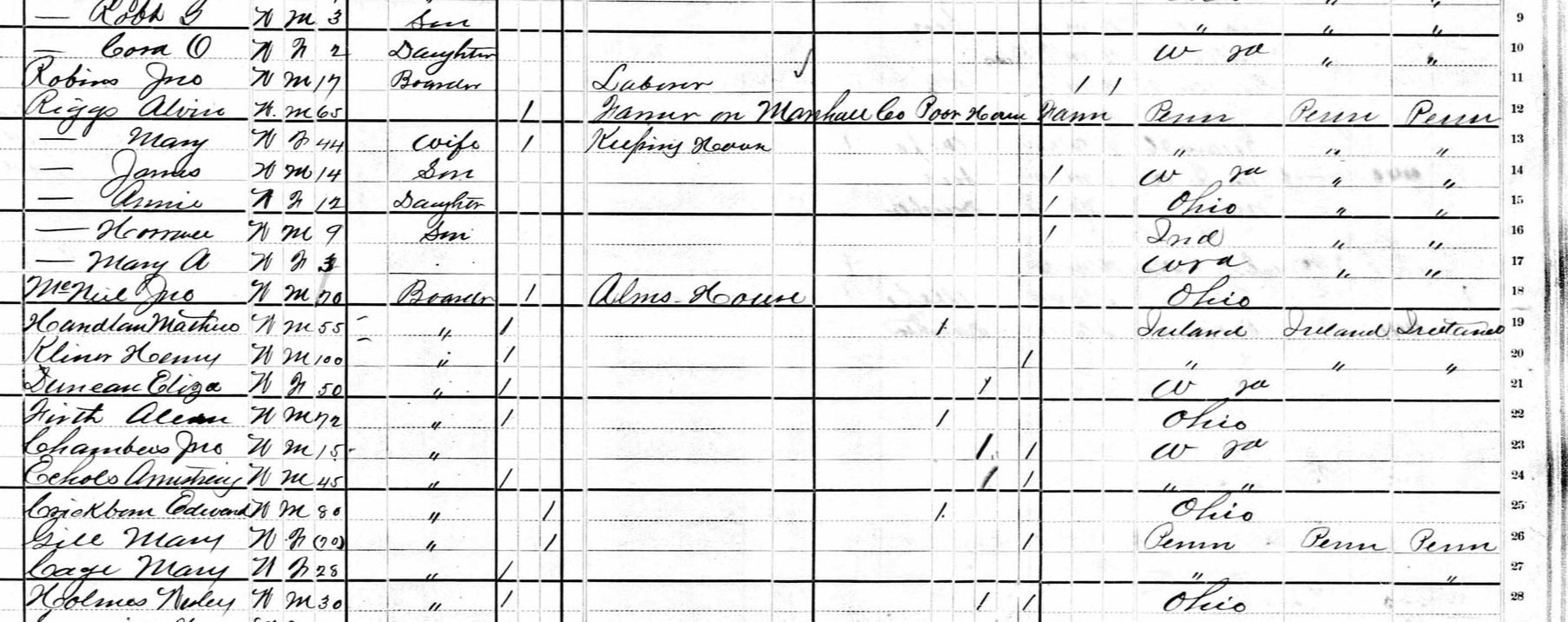12 Rich Resources to Help You Research Poor Ancestors
*This post may have affiliate links, which means I may receive commissions if you choose to purchase through links I provide (at no extra cost to you). All opinions remain my own.
What do you do if your ancestors did not have a lot of money?
Poor ancestors did not generate many of the records we often look for in our genealogy research.
Destitute ancestors were less likely to own or sell land, so they may not have left any deeds or real property tax records.
They may not have left a will or probate because they had few assets to distribute.
They could have been illiterate, making them less likely to leave behind letters, diaries, and other personal records.
They may have moved around a lot if they didn’t own land, so they may be missed in a census or directories.
Because our destitute ancestors created fewer records in their lifetime, we have to get more creative about how we research them.
There are two main categories of records we can use to understand our poor ancestors– ones created regardless of income levels, and those created because someone was in need.
In this article, I share 12 types of records to help you research poor ancestors, as well as resources on where to look for the records.
Related posts:
How To Effortlessly Analyze Old Obituaries And Verify Their Clues
Museum Archives: How To Use This Unique Resource In Your Research
A very brief history of poor relief in the US
Poor relief in the United States was at first modeled after the poor laws of England. The rules around relief set the categories of the needy and who was responsible for providing care.
Aid evolved into indoor relief (poorhouses) and outdoor relief (care in the home), with a municipality managing the care. As appointed officials, Overseers of the Poor were in charge of local relief programs.
Related posts:
6 Ways the Library of Congress Online Collections Can Help Your Genealogy
How to Use the Online Archive of California in Your Genealogy Research
Why You Need to Use Libraries and Archives in Your Genealogy
Resources for researching poor ancestors
1) Poor house records
These are one of the most commonly known types of records for researching impoverished people.
Poor houses had a lot of names – almshouses, county farms, public homes, county homes, poor farms . . . But they are all the same type of institution, created to help the needy in the area.
Poorhouses began in England in the 17th century, with local towns taking care of residents who could not support themselves.
The practice continued in the US and was an early form of social welfare before programs like Social Security. People could be in the county poor farm for reasons like old age or another infirmity. Residents of these institutions were often called terms like inmates or paupers.
Almshouse registers can contain genealogical information like marital status, occupation, birthplace, and age. Some registers also include the births and deaths of the residents.
2) Binding out of children
Orphans, half-orphans, and children from impoverished families could be “bound out” as an apprentice or indentured to a trade.
Information about bound out children can be in various records, including probate files and orphanage papers. The records may be brief or give details like how long the indenture would last and what the guardians were responsible for providing for them. Records can also tell you the names of relatives and what happened to the child.
3) Overseer of the Poor records
Overseer of the Poor was an elected position responsible for outdoor relief, like food, clothing, and financial support. They also supervised the local public homes.
My 4th great-grandfather, Samuel Jones, appeared on the Overseer of the Poor’s list of poor nine times from 1861 to 1884 for receiving sums ranging from $2.25 to $106.48.
4) Auction records
Yes, they auctioned out the care of the down and out to the lowest bidder. The destitute person would live with a family or individual for a specified period of time. This practice, as well as binding out, would sometimes lead to harsh treatment.
5) Tax records
White males of majority age have to pay annual taxes. While your ancestor may not have had real property, they may appear in personal property or poll tax records.
Samuel Jones did not own any property but paid taxes on 17 cows in 1835 and 16 cows in 1841.
If a person was completely destitute and could not afford any taxes, they should also appear on a record as such.
6) Censuses
Censuses are, of course, one of the records that form the foundations of our family tree research. Depending on the year, these documents provide the value of their personal and real property.
You can also discover if your ancestor was living in a county home for census years beginning in 1850.
The below image shows the managers and residents of the Marshall County Poor House in Washington, Marshall, West Virginia in 1880.
Image: Ancestry
In 1880, the government also took a special supplemental census for Defective, Dependent and Delinquent Classes. While the terms used in this census are old fashioned today, they can tell you about your ancestors if they appear in it.
There were seven schedules taken: insane, idiots, deaf-mutes, blind, homeless children (in institutions), prisoners, and paupers and indigent inhabitants (in institutions).
The Pauper and Indigent Inhabitants schedule records a person’s residence and how much a locality or institution was paying to support them. The schedule also captured whether they were able-bodied, habitually intemperate, and if they had been convicted of a crime.
7) Pensions
There were various forms of pensions, including military and Mothers’ pensions.
For military pensions, widows, and children, and in some cases, parents could receive the pension of a soldier. Because the applicant had to prove their relationship to the deceased veteran and their need for the pension, these are genealogy treasures.
Civil War pension records, in particular, are gold mines. My 4th gg, Samuel Jones received a parental pension for his son Henry, who died at Andersonville in the Civil War. Henry was a widower with no children, so Samuel was able to file a claim.
The 64-page application is bursting with details about Samuel’s ill health, which prevented him from working. It also has affidavits from Henry’s regiment mates and family members confirming Samuel’s needs and giving valuable information like birthdates and familial relationships.
Mothers’ pensions began in the early 1900s to help mothers keep their children in the home with them. The files are rich in documenting the needs of mothers. These can also name family members and their birthdates and places, and more.
8) The records of people around your ancestor
Your ancestor may not have left letters, diaries, or deeds, but they may be in similar records of the people around them.
They may be in probate inventories listed as owing money to the deceased. They could also have been a witness to a deed, even if they didn’t own land themselves.
It’s hard to predict where they may appear in the records of someone they knew and it’s impossible to search everything. Start with looking for records of local merchants that they may have done business with or the deeds of their neighbors.
They can also make an appearance in correspondence, scrapbooks, and photos of their known associates.
9) Church records
Your ancestor may not have had a lot of money, but they attended church. Since religious records like church registers are not related to financial status, poor people are likely to appear.
You can uncover siblings, immigration/migration dates to that place, maiden names, birthplaces, previous spouses, and what activities they participated in.
10) Court records
Court records are an underused resource in general, but they can tell you a lot about destitute ancestors and are worth searching through.
Your ancestor may have taken someone to court or had a claim filed against them for not paying a debt. They could appear as a witness in a case. There could have been a messy divorce.
I found court records for Samuel Jones when he was placed under conservatorship for being insane (senile). And then I found his wife, also placed under conservatorship for being insane after Samuel died, despite being much younger. (I suspect one of their sons was doing something funny.)
Be sure to look at civil court records and criminal court records.
If you think your ancestor couldn’t have committed a crime, remember that it may have been a minor issue like being drunk.
11) Old Newspapers
Historical newspapers are an important genealogy resource in general but are especially important for researching your poor ancestors because they have stories that you may not see elsewhere.
Social columns are a great place to search for mentions of them. For example, I found a blurb saying:
“Samuel Jones, who has been fortunate enough to get quite a little ‘wad’ of back pension money for the loss of a son in the army, has bought the Mary Francis farm on Hartland Hill with a part of said ‘wad.’” (Spirit of the Age, 17 September 1879, p. 3).
This led me to the deed.
Your ancestor may appear in an article about court cases, bankruptcy filings, or other news like their house burning down.
12) County history books
While generally only prominent families were mentioned by name, county histories give information about how the local community took care of those in need.
Related posts:
11 Smart Strategies For Searching For Ancestors Who Changed Their Name
How To Avoid A Brick Wall And Research Your Ancestors With Common Names
How and Why to Research Your Collateral Ancestors
Where to find record collections about poor ancestors
Before diving in to search for records, check state statutes about poor relief laws to see what programs were available at the time. This can help you understand what records may be available for a specific place.
To find collections on the records discussed above, there are several places to look.
The majority of these records are not digitized and if they are, many are not indexed to be searchable and need manual searching.
But please don’t let that discourage you. While it may take more time to dig up details about your poor ancestors, it is worth it.
I would never have known that my Samuel Jones was receiving aid from the local Overseer of the Poor if I hadn’t contacted the local historical society, for example.
FamilySearch has many collections covering the records mentioned. But a lot are not indexed.
Ancestry also has a lot of related records.
Internet Archive has some digitized records, including poorhouse registers.
Digital Public Library of America has images and manuscripts from all over the US. Learn more about how to use the DPLA here.
ArchiveGrid lets you search archival collections in the US, Canada, and Australia
Local libraries can have materials and finding aids about local institutions like almshouses.
County courthouses will have deeds, civil and court records, divorces, and probates, and may have binding out records.
County clerk offices. These offices maintain vital records, but some have orphanage, poorhouse, and other institutional records.
City, county, and state archives. These will have a wealth of records that can relate to your poor ancestors.
Genealogical and historical societies. As these often have their own archives and libraries, societies can also have many records about the indigent. For example, the Colonial Society of Massachusetts has The Eighteenth-Century Records of the Boston Overseers of the Poor.
Doing a Google search of the locality and what you are searching for can often lead you to a record set.
Related posts:
7 Simple Steps To Creating A Genealogy Timeline (And Why You Need One)
How To Easily Organize Your Genealogy To Do List Into Simple Time Blocks
How Setting Genealogy Goals Makes You A Better Researcher
Final thoughts
Because poor ancestors left behind fewer genealogy records like deeds, they can be more challenging to research.
But some records were created no matter how wealthy someone was, and some because someone was poor.
These records can give insight into more invisible ancestors that may appear in other common genealogy sources.
What resources have you tried using to research poor ancestors?


